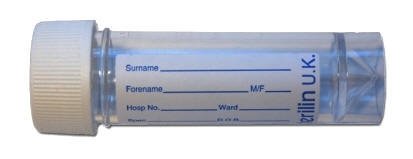Beta-2-transferrin (TAU protein) for ?CSF Leak
Chemical Pathology
Notes
- Cerebrospinal fluid (CSF) is normally only found within the brain and spinal canal. If there is injury to the membrane surrounding the brain or spine (due to trauma, surgery, infection or neoplasm), then CSF can leak out, particularly via the nose (rhinorrhoea) or ear (otorrhoea).
- During surgery this is usually immediately corrected or naturally stops but very occasionally may persist.
- CSF leakage can be seen on scans but if doubt remains then a useful test is detection of beta-2 transferrin (also known as asialotransferrin or tau protein)
- β-2-transferrin is a carbohydrate-free (desialated) form of transferrin, almost exclusively found in the CSF, and detection of this protein can confirm a suspected CSF leak.
- Analysis of a simultaneous blood sample in parallel with the leakage fluid avoids the risk of false positives due to genetic variants or excess alcohol use.
- **DO NOT SEND CSF SAMPLES VIA THE AIR TUBE. SAMPLES MUST BE TAKEN BY HAND TO PATHOLOGY RECEPTION**
Sample requirements
Leakage fluid (1) plus a simultaneous blood sample (2):
- A few drops of leakage fluid (minimum 100µL) collected into a plain 30mL Universal

A simultaneous blood sample taken into a 5mL gold top tube (rust top for Acute Unit)

Storage/transport
Send at ambient temperature to the laboratory on the day of collection.
Required information
Relevant clinical details, including any recent surgery or trauma.
Turnaround times
Samples are sent for analysis to North Bristol NHS Trust with results expected back within 1 week. If results are required more urgently, please contact the duty biochemist.
Reference ranges
Results are provided as a qualitative report i.e. as positive or negative for β-2 transferrin.
Further information
To learn more visit Lab Tests Online: Tau Protein.
Page last updated 29/04/2024